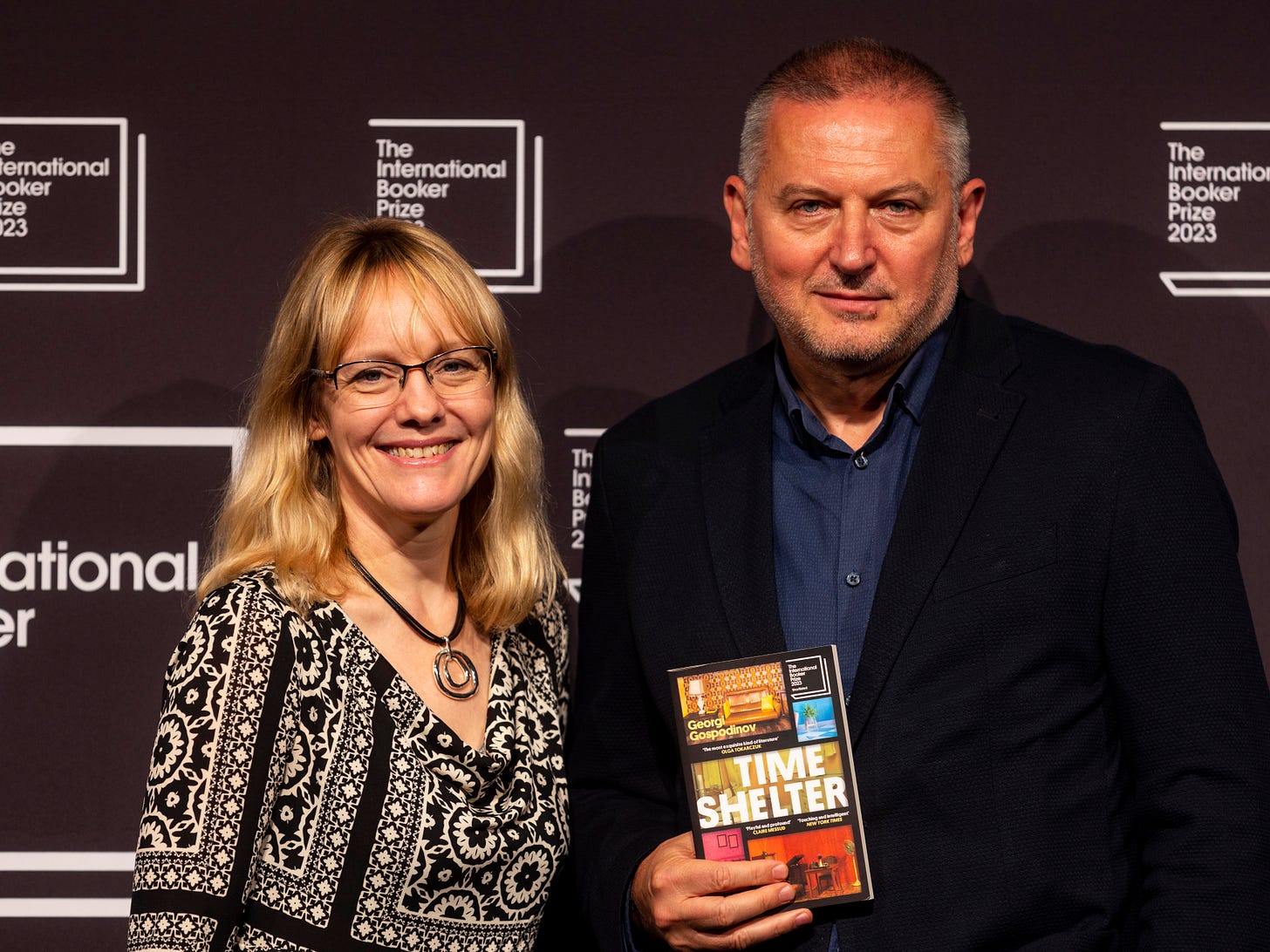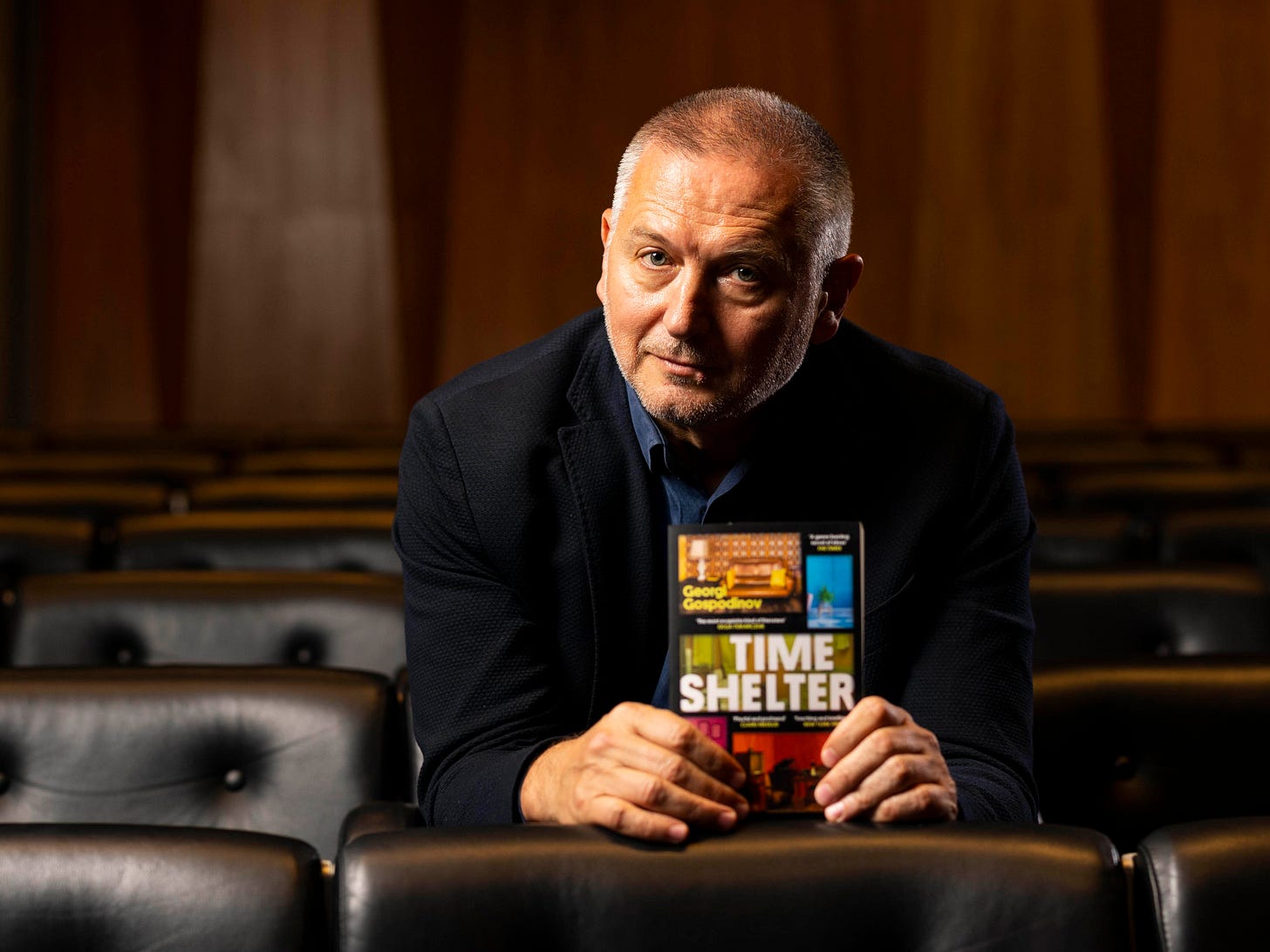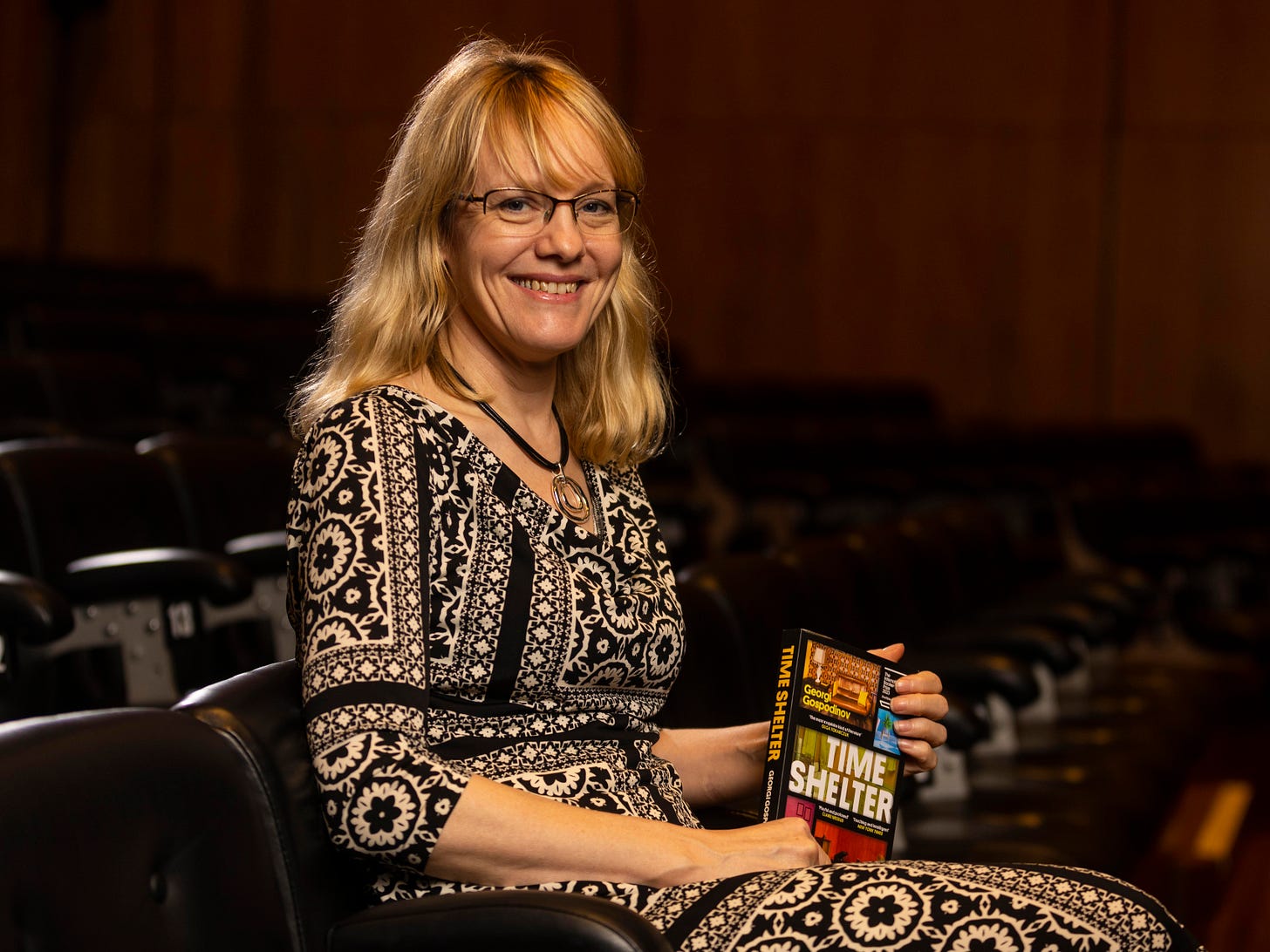Time Shelter by Georgi Gospodinov, translated by Angela Rodel, wins the International Booker Prize 2023
As Time Shelter becomes the first book translated from Bulgarian to win the International Booker Prize, we've rounded up everything you need to know about the novel
Time Shelter, written by novelist and poet Georgi Gospodinov and translated from Bulgarian by Angela Rodel, has been announced as the winner of the International Booker Prize 2023. The £50,000 prize is split between the author and translator, giving them equal recognition. The winner was announced by chair of the judges, Leïla Slimani, this evening at a ceremony at Sky Garden in London.
Time Shelter centres on a ‘clinic for the past’ for Alzheimer’s sufferers where each floor reproduces a past decade in minute detail, allowing patients to go back in time to unlock what is left of their fading memories. As word spreads about the clinic, an increasing number of healthy people seek refuge, hoping to escape the horrors of modern life, thereby creating an unexpected conundrum as the past begins to invade the present.
Discover more about this year’s winning novel here.
Why did Time Shelter win?
Leïla Slimani, Chair of the International Booker Prize 2023 judges said:
‘Our winner, Time Shelter, is a brilliant novel, full of irony and melancholy. It is a profound work that deals with a very contemporary question: What happens to us when our memories disappear? Georgi Gospodinov succeeds marvellously in dealing with both individual and collective destinies and it is this complex balance between the intimate and the universal that convinced and touched us.
‘In scenes that are burlesque as well as heartbreaking, he questions the way in which our memory is the cement of our identity and our intimate narrative. But it is also a great novel about Europe, a continent in need of a future, where the past is reinvented and nostalgia is a poison. It offers us a perspective on the destiny of countries like Bulgaria, which have found themselves at the heart of the ideological conflict between the West and the communist world.
‘It is a novel that invites reflection and vigilance as much as it moves us, because the language – sensitive and precise – manages to capture, in a Proustian vein, the extreme fragility of the past. And it mixes, in its very form, a great modernity with references to the major texts of European literature, notably through the character of Gaustine, an emanation from a world on the verge of extinction.
‘The translator, Angela Rodel, has succeeded brilliantly in rendering this style and language, rich in references and deeply free.
‘The past is only ever a story that is told. And not all storytellers have the talent of Georgi Gospodinov and Angela Rodel.’
Who are the author and translator?
The author: Georgi Gospodinov
Georgi Gospodinov was born in Yambol, Bulgaria, and his works have been translated to acclaim in 25 languages. He is the most translated and internationally awarded Bulgarian writer to emerge after the fall of communism. His novels, poems, essays, screenplays and graphic novels have established him as one of the leading voices of European literature.
Gospodinov’s novels have been shortlisted for more than a dozen international prizes – including the PEN Literary Award for Translation, the Premio Gregor von Rezzori, the Bruecke Berlin Preis, and the Haus der Kulturen der Welt Literaturpreis – and have won the 2016 Jan Michalski Prize for Literature and the 2019 Angelus Literature Central Europe Prize, among others. He was described by La Repubblica as ‘a Proust from the East’.
Time Shelter is his third novel to be published in English. The Italian edition of the book won the prestigious Premio Strega Europeo prize last year.
His graphic novel The Eternal Fly was the first Bulgarian graphic novel and his short story ‘Blind Vaysha’ was adapted into a short animation film that was nominated for an Oscar in 2017.
The translator: Angela Rodel
Angela Rodel is a literary translator, musician and actor who lives and works in Bulgaria.
Originally from Minnesota, United States, Rodel holds degrees from Yale and UCLA, and has received NEA and PEN translation grants. Her translation of Gospodinov’s The Physics of Sorrow won the National Book Center’s 2015 Peroto Prize for best translation from Bulgarian, the 2016 AATSEEL Prize for Best Book of Literary Translation and was nominated for the three most prestigious translation awards in the US: finalist for the 2016 PEN Translation Prize, the 2016 National Translation Award from the American Literary Translators Association, and Three Percent’s Best Translated Book Award for 2016.
Her poetry and prose translations have also appeared in numerous literary magazines and anthologies, including McSweeney’s, Little Star, Ploughshares, Granta.org, Two Lines, and Words Without Borders, among others. In 2014, she was awarded Bulgarian citizenship for her translation work and contribution to Bulgarian culture.
As well as working as a literary translator – and teaching literary translation – she has also been a singer in a Bulgarian folk band, acted in a Bulgarian crime drama, and starred in a film, Kozelat, in which she rides a goat.
What else have the International Booker judges said about Time Shelter?
‘An inventive, subversive and morbidly humorous novel about national identities and the seductive dangers of memory and nostalgia.
‘The wit and inventiveness of the writing, which never overwhelms the compassion the author has not only for his characters, but also for us, the readers.
‘It compels us to question our concepts of identity: not just national, individual, societal, but also historical and temporal. How much do we reshape the past to suit our present and our future? In addition to the borders dividing countries, we see that time and memory are also different forms of borders. How do individuals, nations, even continents, decide on what to remember, and what to forget? The novel also makes us contemplate the very concept of Time itself in a different way. Nostalgia is more than what it used to be.’
What have the author and translator said about the book?
Georgi Gospodinov said:
‘My urge to write this book came from the sense that something had gone awry in the clockworks of time. You could catch the scent of anxiety hanging in the air, you could touch it with your finger. After 2016 we seemed to be living in another world and another time. The world’s disintegration with the encroachment of populism and playing the card of the “great past” in the US and in Europe provoked me.
‘Brexit was the other trigger. I come from a system that sold a “bright future” under communism. Now the stakes have shifted, and populists are selling a “bright past”. I know via my own skin that both cheques bounce, they are backed by nothing. And that’s why I wanted to tell this story about the “referendums on the past”, undertaken by every European country. How does one live with a deficit of meaning and future? What do we do when the pandemic of the past engulfs us? The last chapter of the novel describes how the past comes to life: the troops and tanks amassed to reenact the beginning of World War II unexpectedly invade the neighbouring country’s territory.
‘The idea of going from the clinics of the past, which deal with patients’/residents’ private pasts, to European referendums on the past was the basic framework for the plot from the outset. But I’m the kind of writer who likes to follow language and the stories themselves. I think language is smarter than we are. I come from poetry, so every word is precious to me. I write my novels sentence by sentence. And if I can get to the point where I’m following the narrator’s voice, with its language and rhythm, and even sometimes surprising myself with the way the story is unfolding, that’s good for the book.’
Angela Rodel said:
‘Georgi and I have been working together for quite a few years – I translated his previous novel as well as many short stories, essays, plays, even a space opera libretto. Our close collaboration has always been delightful and intellectually inspiring; despite his rather intimidating erudition, Georgi is also unusually empathetic and generous with his time and knowledge. Georgi cut his writerly teeth as a poet, so he is very interested in the craft of translation and loves to get into the weeds of rhythm and sound.
‘I actually began translating the book before I had the chance to read it, for the simple reason that it had not been finished yet! Given the success of Georgi’s previous novel, The Physics of Sorrow, numerous people, especially colleagues from his Cullman Center fellowship, but also his agent and others, were very eager to get a peek at his new work-in-progress – thus in the fall of 2019 I translated a 50-page excerpt of what would later become the opening of Time Shelter, which was finally published in Bulgarian in the infamous spring of 2020. Once the full Bulgarian final draft was ready, I dove in and translated the whole book in about six months.’
What have the critics said?
The Guardian:
‘[Gospodinov] can draw out fully dimensional characters from the broken details of their fractured memories. His transitions – between humour and sadness, absurd situationism and reverberating tragedy, pathos and ironic observation – are never obtrusive. Thanks to the skill and delicacy of Angela Rodel’s translation, these qualities are in abundant display for the anglophone reader.’
The New York Times:
‘The morality of artificially returning people to the past, and the broader question of whether this truly brings solace – whether indulgence in nostalgia is curative or pernicious – is the central question of Georgi Gospodinov’s newly translated novel. He is sympathetic to the poignancy of things from before … but rebuffs the scapegoats of globalism, immigration and modernization that supposedly killed them off; we are all complicit in the destruction of history, and going backward can only mean intolerance and the exaltation of traditionalist kitsch…’
The Los Angeles Review of Books:
‘What is true, however, is that we have grown so afraid of the future that we can’t even retreat into the past. Instead, we have chosen inertia on any number of issues. On Russian aggression. On climate change. Would it be better to fracture our futures and live disconnected in past decades of our choosing? Gospodinov points out that recapturing lost time, redeeming the unredeemable, comes at a cost, too. And our current world doesn’t want to pay for a single thing, and so we wait, unsheltered, hoping that all manner of things shall be well.’
The Times:
‘This is not a realist novel. It is very much a genre-busting novel of ideas. This is a book about memory, how it fades and how it is restored, even reinvented, in the imaginations of addled individuals and the civic discourse of nations. Gospodinov’s vision of tomorrow is the nightmare from which Europe knows it must awake. And accident, in combination with the book’s own merits, may just have created a classic.
What are the cultural influences behind Time Shelter?
Georgi Gospodinov said:
‘When I wrote Time Shelter, one of the books that was near to me was The Magic Mountain by Thomas Mann, because when you write a book about time you need The Magic Mountain; you need a Thomas Mann book. And also, because it’s a book about memory, Marcel Proust’s In Search of Lost Time was a very important book to me. But also I could say some poems and poets were very important, like W H. Auden’s poem 1 September, 1939, which plays a key role in the novel.
‘Some songs were very important because it’s a novel about memory, and we know that songs unlock our memory. So songs like ‘Hotel California’ by The Eagles, or many songs by The Beatles. ‘Alabama Song’ by The Doors was very important; this is a song written by Kurt Weill and Bertolt Brech. The whole story of the song is in the novel.’
What makes Bulgarian literature unique?
Angela Rodel said:
‘It’s a relatively young literature. I think the first Bulgarian novel was [published at] the end of the 19th century. So I think that [Bulgarian] writers are a little like kids; they’re excited, they’re enthusiastic and they’re willing to take chances on structure, on types of stories.
‘I find Bulgarian writing and novels so interesting because they really don’t follow any kind of mould. People are willing to take chances more than a long-established literature that has a very heavy canon that puts you in certain genre expectations.
‘Poetry is one of the most central pillars [of Bulgarian literature] and so the sound of the language is always very important – even in the prose, even in novels. I feel like there’s always a conversation going on with Bulgaria’s poetry and with its poetic tradition. And in general, what I love about Bulgarian literature is that Bulgarians are just storytellers; they love to tell stories. I came to Bulgaria to study that folk culture and there’s a really strong tradition of folk storytelling, epic songs.
‘Bulgarians have always been very interested in how many different ways you can tell the classic human stories.’
Watch Toby Stephens read an extract from Time Shelter
Toby Stephens is one of the UK’s best-known television, film and stage actors. In recent years he has starred in the TV series Black Sails (Starz), Alex Rider (Amazon Prime) and Lost in Space (Netflix). Watch him read an extract from the novel below.
Have you read Time Shelter, or is it in your TBR pile? We’d love to know your thoughts on the prize-winning novel in the comments below.











You’ve hooked me. It’s in the TBR pile.
Utterly fascinating concept, and a riveting article.